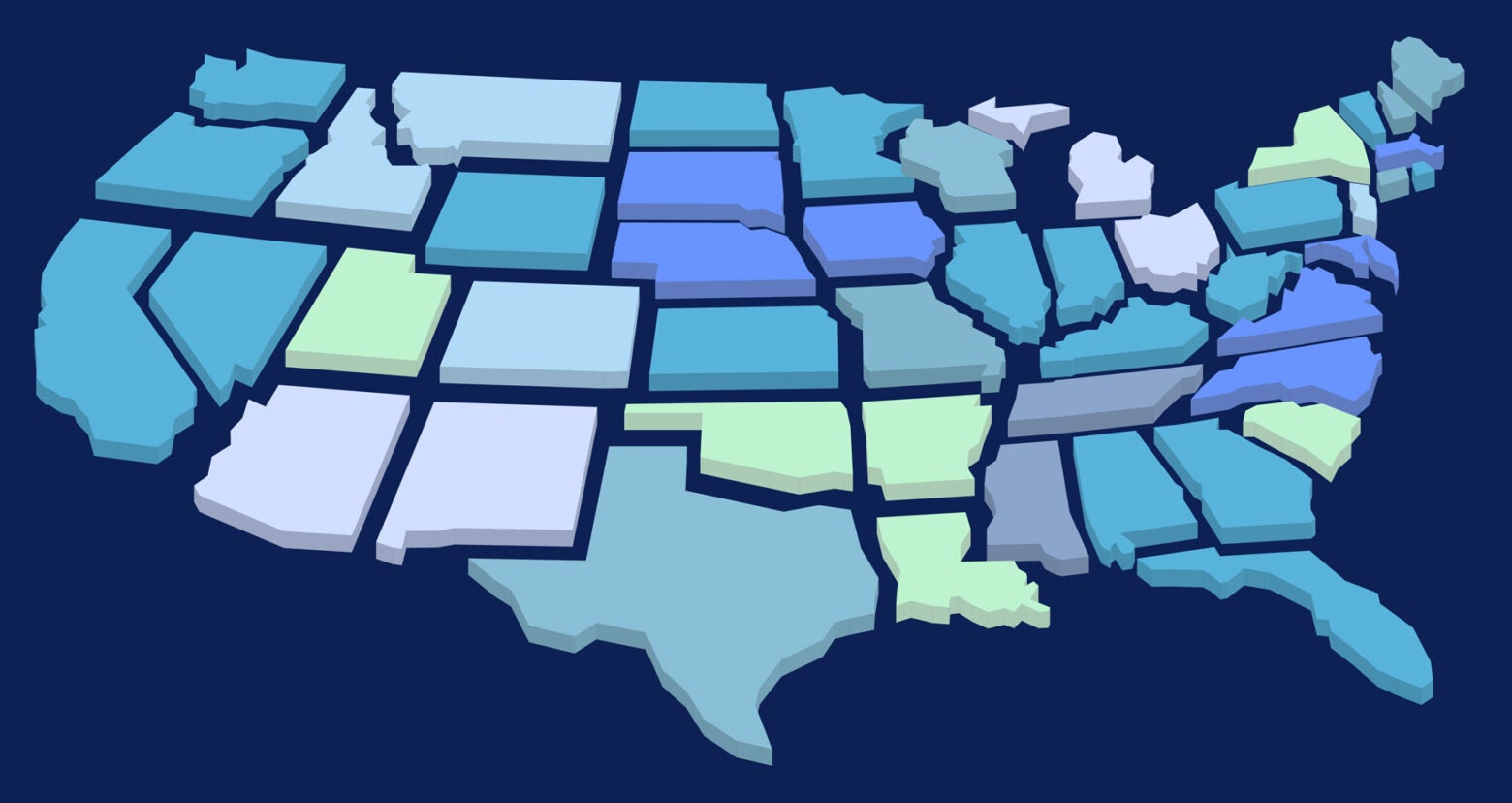
Opinion
How, and when, federalism is good for public health
In the United States, responsibility for public health is lodged primarily at the state or local level. That’s because the U.S. has a federal system, meaning authority is constitutionally shared by the national and state governments. The disadvantages of this arrangement were all too apparent during the height of the COVID-19 pandemic: States gave different messages about the severity of the crisis and the need for vaccination, mask-wearing, and reopening businesses and schools.
These differences played out in death rates, which varied almost four-fold among states. Higher death rates were primarily associated with higher poverty rates, larger percentages of Black or Hispanic residents, availability of quality health care, and the proportion of a state’s voters who chose the Republican presidential candidate in 2020. States that took public health measures such as mask mandates had lower infection rates, and states with higher vaccination rates had lower death rates.
So it may seem that federalism was a clear disadvantage for the people of states that fared more poorly during the pandemic. But the authority federalism allocates to the states over public health can also have advantages. During the pandemic, it provided a second line of defense: States could pursue policies that resulted in rates of infection or death that were far better than the national average. In fact, a number of them did.
Sign up for Harvard Public Health
Delivered to your inbox weekly.
Federalism lets states stay close to the people they serve
Making decisions on the state level has other advantages for public health as well. The federal government is complex and cumbersome, with power spread across multiple agencies. Although the federal government enjoys more resources, which it deployed for the rapid development of COVID vaccines, it struggled with coherent messaging to achieve high levels of vaccination across the country. States are closer to the people they serve, more attuned to local circumstances, needs, and preferences, and more likely to engender the trust of residents. People viewed their state health departments as more compassionate and connected during the pandemic.
The limitations of the federal system in infectious disease response are more recently at issue in the avian influenza outbreak among livestock. Federal government responsibilities are split between three large bureaucracies: the U.S. Department of Agriculture (USDA), which requires testing of livestock moving across state lines and reporting of any positive tests for avian influenza; the Food and Drug Administration, which is authorized to test milk and has stated that milk is safe when pasteurized; and the CDC, which can monitor reported outbreaks of disease in humans but does not have the authority to mandate testing farm workers for possible infection. This fragmented arrangement has clear gaps: Animals that are not being moved in interstate commerce are not being tested, for instance. And very few farm workers are being tested for avian flu—even when they seek medical treatment for illnesses. The lack of testing means the U.S. does not have a way to predict if an outbreak is imminent, or if the virus might be changing into forms that could more readily infect humans.
Federalism gives states more flexibility than federal bureaucracies
States may be able to do more, and do more quickly, than the federal government. In Michigan, a state with significant avian influenza outbreaks, an emergency order requires dairy farms and poultry operations to develop biosecurity practices, including limiting facility access and logging visitors’ entry and exit. Exhibitions at livestock events were initially prohibited until no infections had been identified in the state for at least 30 days. The 30 days were achieved for poultry by July 2024; the order for cattle was modified to allow submission of negative test results for animals to be exhibited. And a Michigan public health bulletin recommends asking people with influenza-like symptoms about possible exposures to birds or dairy cattle, testing them for avian influenza infection, starting antivirals for those who are symptomatic, and implementing seasonal influenza vaccination for workers on poultry or dairy farms. Notably, however, the bulletin does not require the testing of patients and does not require livestock testing across the state. For some of these efforts, the state could draw on a great advantage of the federal government: its financial resources. For instance, the USDA supported biosecurity efforts at Michigan farms.
Such state-level initiatives may not go far enough for meeting national needs for preventing infection spread. No states require that livestock or workers be tested for avian influenza. At the federal level, such testing would boost a response if the outbreak worsened. But states often differ culturally, ethnically, religiously, or ethically, and they may face deep, unresolvable moral disagreements within their respective borders. These disagreements may also appear among the states. Federalism means states may take different paths but also benefit from the resources and protections of the far larger national government.
Federalism allows states to experiment
U.S. federalism creates room for experimentation. Within a federalist system, states may try out different approaches to controversial policy issues, serving as models for other states if the experiment succeeds or as cautionary tales if it fails. In the U.S. federal system, when residents of a state disagree with majority views, they can move in search of environments more to their liking. This is happening right now in states with stringent abortion bans. Idaho, for instance, is seeing an exodus of physicians and closure of maternity services. To be sure, not everyone can pick up and move, but movement does offer a safety valve and could ultimately drive policy change as long as the right to travel remains protected, as Justice Kavanaugh assumed in Dobbs v. Jackson Women’s Health Organization.
Experimentation can only go so far, however: Imagine the confusion that could result if common pharmaceuticals were subject to approval by individual states. It would be devastating, too, if national resources were no longer available for Medicaid or for collecting public health data. Federal privacy protections can apply to electronic medical records created in one state, stored in a second, and accessed in a third, although controversies are continuing about access to these records without uniform federal protections. Contrast that with continuing federal prohibitions of cannabis, which have impeded the ability to assemble a reliable evidence base about its medical uses. And a federal ban on abortion would be even worse for maternal health than the current patchwork of state bans.
We live in a time of persistent injustice, moral conflict, and increasing partisanship. The variation and policy negotiations permitted by federalism often offer robust options. People may not get all the public policies they prefer, but they have a chance to find ones they want without confronting the choice of becoming policy refugees and leaving the nation altogether.
Image: Adobe Stock


